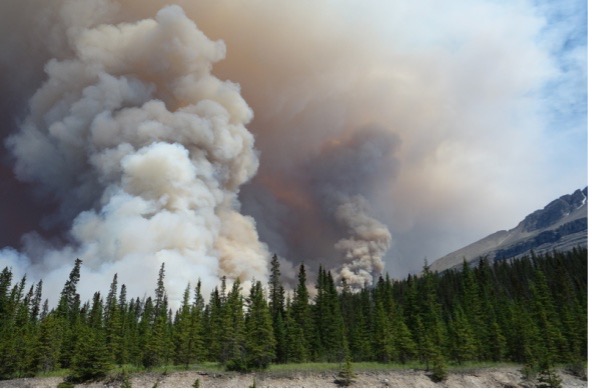Growing up in Northern California, my family and I have been able to enjoy hiking in our national forests shaded by majestic redwood trees, rafting in the Trinity River and camping at both Trinity Lake and Shasta Lake. As a kid, I remember Smokey the Bear reminding us that “Only you can prevent forest fires.” Fortunately, we never actually experienced forest fires at that time in my life. But all of that has changed. Forest fires are the new norm for residents in California and Oregon. It seems each year that, as fire season rolls around, we find ourselves once again concerned about the safety of our forests, communities and our health.
In this article, I’m going to share with you some tips and tricks to reduce your exposure to smoke and reduce the impact of toxic irritants that can create some very serious health problems.
The Negative Health Effects of Forest Fire Smoke
It’s pretty evident that smoke filled air is hard to breath. The mixture of small particles and gasses that are a result of burning plants and trees are toxic to our health. Combine these toxins with those from burning homes and automobiles that have not been able to escape the destruction caused from forest fires and we have a real toxic overload on our hands.
On a very basic level, smoke irritates our eyes, nose and throat. It can cause headaches, nausea and difficulty breathing. These symptoms are even worse for people with asthma, allergies, suppressed immune system as well as heart and lung conditions.
Since smoke exposure from forest fires seems to be unavoidable at the present time, we need to protect ourselves to the best of our ability. Here are a few tips to reduce your exposure, detoxify from these potent irritants and protect your health.
5 Tips to Protect You from Smoke Exposure
1. Avoid Outdoor Activities – When smoke levels are high in your area, avoid outdoor activities as much as possible. Strenuous activities such as running, biking or even going for a vigorous walk opens the lungs and allows for deeper breathing which is great for your cardiovascular system when the air you are breathing is clean. However, during these intense cardiovascular activities it’s best to stay indoors and avoid pulling smoke deep into your lungs.
2. Keep Vehicle Air Clean – When driving, keep the windows rolled up and use the air conditioning system in the recirculating mode. Some smoke will still enter the vehicle but you will be able to minimize the effects if you are not pulling external air in through the vents.
3. Keep Indoor Air Clean – Keep windows and doors closed and consider using an air filter for recirculating and purifying the internal air. According to Consumer Reports multiple studies of room air purifiers show that using HEPA filters reduces particulate matter by as much as 50 percent.
4. Rinse Nasal Passages – Rinsing nasal passages by scooping up water in your hand and submerging your nose into the water or by using a neti pot, with a saline solution will rinse away toxins and also viruses and bacteria before they have chance to enter the lungs and the blood stream.
5. Hydration – If it seems like every single health concern is made better by drinking water, it is! Drinking plenty of water is a crucial step in protecting us from smoke exposure. When properly hydrated, our eyes, nose and throat have more moisture to alleviate the dry and scratchy feeling caused from smoke. The air we breathe is made moist and is easier to breathe. Drinking plenty of water helps the liver to detoxify the pollutants that were inhaled. You can read more about the benefits of water and how to get enough of it in this article, Good Hydration.
If smoke is very thick or if you suffer from allergies, asthma or any disorders that effect your lungs its best to us and N95 respirator mask when you have to go out and consult with your physician or allergist.
Stay well and may the rains come soon my friend!!!
Eureka Brake & Automotive
707-443-2122
Eurekabrake.com

